#explainer
Explore tagged Tumblr posts
Text
Want to get into Dimension 20, but don't know where to start? We've got a very helpful video for YOU up on Dropout and the Dimension 20 Youtube channel! Also, Brennan finally explains all the titles 🧠
Watch the full video here
1K notes
·
View notes
Text
The UN has made the claim that they distribute food in Gaza twice a week. They have made similar claims several times, explaining that hunger is still an issue because they are only able to distribute food two times a week.
However, some on the ground in north Gaza say this statement is dishonest. When the UN makes these statements, it implies that it is servicing the entire Gaza Strip. They are not. Due to Israeli blockade, absolutely no aid of any kind has reached northern Gaza in about two months.
People in northern Gaza are starving to death because there is no food, none. Some report having to make bread out of animal feed, eat cardboard, and drink seawater and dirty puddles. What little food can be scrounged up is not enough to support anyone’s nutritional needs, let alone those of 800,000 people.
If people in the central and southern regions are still starving, even with the UN and partners brining in food twice a week, imagine the state of people in the north. If even adults in the north are reporting severe hunger pains, imagine what children are experiencing.
The point of this post is not *necessarily* to lambast the UN, although there is plenty of reason to do so. Rather, it is to address one source of misunderstanding which is impeding some people’s ability to grasp the full breadth of the catastrophe in the north.
#sources may be provided on request but I am hesitant to put people’s names out there when they are criticizing the UN#gaza genocide#north gaza#gaza#gaza strip#gaza under attack#free gaza#from the river to the sea palestine will be free#text#explainer#palestinian genocide
6K notes
·
View notes
Text
GET HYPED FOR #UNEND ☁️ 🚀
Our amazing Junior Lore Keeper Jared Deiro is BACK and broadcasting straight from the Fold with all the latest happenings in the Cosmos! A supernatural ship is launching into the UN-known as the new series begins, and there's already intrigue lurking between the crewmates...
EXPERIENCE UNEND ON YOUTUBE AND WHEREVER PODCASTS ARE FOUND! 🧡
#midst#midst podcast#unend#third person#critical role#explainer#scifi#fantasy#western#surreal#space travel#exploration#podcast#podcasting#audio drama#audio fiction#midst cosmos
55 notes
·
View notes
Text
Compulsory Voting Looks Like...?
In my Voting With Spite post, I mentioned that Australia has compulsory voting, and I noted that quite a few people had either positive or negative reactions to that idea. I thought it might be a good idea to talk briefly about what Compulsory Voting actually does to your voting scene.
Now, to be clear, I'm going to be talking about the Australian Experience - that's what I know. I'm aware that Brazil and Belgium both have Compulsory Voting as well, and their experiences are likely to be a bit different. So, let's go through the big ones:
Do you need ID to vote?
Here, the answer is no - an ID can help, because when you get your name marked off the roll at a voting station, they use your name and address, and our driver's licenses have that, but it's not essential. Indeed, if you've changed address and that hasn't been recorded on the roll, you can still vote - this is called a "declaration vote", because the vote is put into an envelope where you "declare" that the information provided is correct, and the vote is counted once the electoral commission has verified the information.
One might think that this open up our system to a lot of fraud, but one of the fun parts about compulsory voting is that voter fraud is very easy to study - in such a system, if someone steals someone else's identity to vote, it will appear that that person has voted twice, and it gets investigated. The only other big fraud option is fraudulent enrolment - and again, because everyone is on the electoral role, if there's concern regarding a fraudulent enrolment, the electoral commission can check with people at the address of the enrolment. The AEC do these sorts of checks after every election, and it turns out, while there are often double votes, most of those are administrative errors (crossing off the wrong person somewhere), or entirely innocent (people with memory issues voting multiple times because they forgot that they'd already voted). During the 2018 election, only 118 cases were deemed worth forwarding to the Federal Police, out of over 20 million votes.
Do Politicians still play to the base?
In Voluntary voting systems, there is a well-known phenomenon where there's an incentive for politicians to, instead of trying to aim for policies that will satisfy the most people, to instead aim directly at their "base", their natural political home voters. The idea is that you don't actually need to persuade the other side to vote for you, you actually need to persuade your side to vote for you. The only prevailing counter to this is that you don't want to be so egregious that you motivate the other side to vote against you.
Historically, this has not been the case in Australia. In Australia, you can depend on your base to vote for you - they aren't going to stay at home, because it's compulsory to vote.
So they play to the centre?
Honestly, it's complicated. The question is often not about whether you're politically "in the middle", but where you live - Just like in other electorates, there are safe seats (where voter movement isn't likely to kick out the incumbent party) and marginal seats (where the margin of votes for a given party is quite small, generally less than 5%). Marginal seats are where political parties can potentially score a seat with only a little bit of a push, so it's standard strategy to build your campaign promises to directly target those marginal voters.
What those marginal voters actually want varies quite a bit, depending on where in the country they are - a marginal seat in Rural NSW need different targeting than a tiny marginal seat in Melbourne. In general these voters are looking for actual improvements in facilities and economic policy, rather than ideology, so while politicians from those seats may be absolute culture warriors, that often isn't what people in the seat are asking about or listening to - they want to know what the nutcase is actually going to do for them.
With that said, rural voters are more likely to want a personal connection to their MP and are much more likely to vote on who they, personally, like the most. This is less the case in Urban electorates, who care much less about who the MP is and what they're like, and much more about their party's platform.
But also also, there is a strong emphasis in politics about playing to "Ordinary Australians", which one can consider a code for "centre views". Of course, Australia as a society is pretty conservative in many ways, so what you consider "centre" may be a little left of what we consider "centre"...
So yeah, not nearly as simple as "playing to the centre" - there's a lot more involved there.
Are there such thing as "Independent" voters?
In Australia, at least, the idea of an "Independent" voter doesn't really exist - Australia's leaders aren't voted for in Primaries, so you don't need to have your political affiliation marked. Some Australians are members of political parties, but that number is tiny - in 2022, the two major parties had 100,000 members between them, in a population of 26 million people - about 0.4% of the population, maybe 0.5% if we count all the minor parties as well.
Are compulsory voters more engaged voters?
In a word? No. Australian society in general doesn't encourage people being overly involved or engaged in politics, especially in working-class subcultures (and of course, every Australian claims to be working class, regardless of their actual class). Like in many places, there's a pressure in face-to-face conversation to suppress political discussion to avoid conflict, and I can assure you that researching your candidates/parties before an election isn't a common activity (and I understand why - there's so many of them).
As a consequence, Australians don't tend to change their vote that often - in fact, studies in Australia have shown that there's a strong correlation between how you vote, and how your parents vote. A Labor voter is likely to stay a Labor voter, and a Liberal voter is likely to stay a Liberal voter, even if they're not a member of the party. This is why most election promises are much more about giving stuff to voters, rather than about legislation around society itself - It's considered safer to deal with infrastructure than it is to deal in culture wars issues.
Wait, if voters don't change often, how do opposition win?
Well, rarely is the honest answer to that question here. Since 1950, the party in federal government has changed only seven times:
Once in 1972, from the Coalition to Labor
Once in 1975, from Labor to the Coalition (although that one was a particularly odd one)
Once in 1983, from the Coalition to Labor
Once in 1996, from Labor to the Coalition
Once in 2007, from the Coalition to Labor
Once in 2013, from Labor to the Coalition
Once in 2022, from the Coalition to Labor
And during that time, there's been 27 elections, so in 20 out of 27 elections, the incumbent won. But with that said, every time the opposition wins, it's in a landslide, winning a huge number of seats.
The reasons for this are obviously complex, but the way I like to think about is that in Australia there's a certain inertia in the voting populace. Once your vote is set, there's not a lot that's going to change that vote - you're generally going to vote for the party that aligns most with you, and that isn't likely to change much. But as a party keeps fucking up (because they always fuck up), the more that votes wobbles - it might, initially, move your party down the preferences, which you might not notice (because it still funnels to you), but eventually, you've pissed off so many people that everyone votes for anyone but you arseholes, which results in the other party getting in with a landslide.
The previous government is usually horrifically savaged, to the point that it takes a few election cycles for them to slowly rebuild numbers, regain talent, and get themselves into a position where, now that the other side has fucked up sufficiently, voters are willing to let them have another shot at the big time.
This, awkwardly, also tends to stifle politically-lead social change, as well. Firstly, it can take decade or more for a party that is willing to engage with your chosen direction of society to become the Government, and even once they are there, it tends to be the case that Governments won't consider leading such changes until they are certain that everyone wants it - The Gay Marriage Postal Survey is an example. Any opinion poll could show you that the majority of Australians were for gay marriage, but the Coalition government of the time was against it. As a delaying tactic, they insisted on a postal survey (it couldn't be a plebiscite, because they couldn't get that through their own MPs) so every Australian had to vote on the issue. The result? 61.6% were for Gay Marriage (and up to 90% in some electorates!).
What if you can't vote?
Australia is something of a world leader in working to ensure that everyone can vote, because it's been generally established that you can't punish someone for not doing something the government has made it impossible for you to do. So, all Australians have access to:
Early Voting (usually for at least 3 weeks before election day)
Postal Voting (and you just have to post it on Election day, it can be received afterwards).
The voting infrastructure is set up that you can vote at any polling station in your state (we now print lower house ballots on demand, so every station has access to every ballot), and there are specific polling stations for interstate voters (where upper house ballots for every state are available).
There are mobile polling stations for voters, so even if you live in a remote town and can't drive to the nearest polling station, polling stations can drive out to you!
These mobile polling stations also attend prisons and hospitals to provide voting access for people who cannot leave to vote.
We even now have telephone voting for Blind folk, with a specialised system set up to allow for a secret ballot, so the phone person assisting the blind voter won't know who the blind voter is.
Australian embassies in other countries are also available for voters, although you are not actually required to vote if you're not in the country during the election campaign.
So, our voting infrastructure is built, as much as is practicable, to ensure that every voter gets every opportunity to vote. If you can't get to a booth on the day, you can early vote or postal vote.
To be clear, this is not a requirement of compulsory voting - it's quite possible to go to this level of effort in a voluntary voting system, and I can absolutely imagine a compulsory voting system that also made it difficult for people to vote (likely disproportionately affecting your political enemies).
Does Compulsory Voting help Minor Parties?
Not really - Preferential voting definitely helps minor parties, but not Compulsory voting. There is one way it might help though - As noted above, if you're pissed off with your current party, you may bump another party higher up on your preferences, even put them as your "1" vote. In a Voluntary voting system, such people might, instead choose not to vote and stay at home, so in that sense, I guess minor parties can be the beneficiaries of voter anger, but of course, that couldn't be the case without preferential voting.
Got more questions? My asks are always open! Ask away!
92 notes
·
View notes
Text
youtube
Many of you know the classic CBS Special Presentation animation and iconic music.
This is how it was made!
9 notes
·
View notes
Text

Explainer
The unprecedented conditions firefighters are facing in LA
Fire crews are facing dire challenges, hurdles that have intensified the fires and are complicating the response
As multiple fires rage around the Los Angeles basin, the 7,500 fire and emergency personnel on the ground are facing unprecedented conditions.
At least five LA residents have been killed, and the death count is expected to rise as responders search burned areas. At least 10,000 structures have been destroyed, and several of the five blazes are still burning out of control.
“This is what our crews train for,” Capt Adam VanGerpen of the Los Angeles fire department told local news. “We’re used to keeping long hours. What’s keeping us going is there’s work to do. There are still homes on fire, there are people being evacuated. We’re just at the beginning stages of this.”
Fire crews are facing dire challenges, hurdles that have intensified the fires and are complicating the response.
Whipping winds
Hurricane-force winds peaked at 100mph in some areas of the LA basin during the week. Most of the mountain areas remain under a red-flag warning, indicating that any fires that start will spread rapidly. High winds stopped scooper planes and helicopters from dropping water on the fires on Tuesday night, and may do so in the future. But they can also disperse dropped water in all directions, instead of allowing it to drop on flames.
In addition, winds blow embers into new areas. Dry desert air from the east – which is not normal this time of year – has been fanning the flames while blowing over hilltops and down through the canyons. That makes the job of containing a fire much harder.
“This wildfire was the most chaotic winds I’ve experienced in 20 years,” Capt Erik Scott, a Los Angeles fire department spokesperson, said about the Palisades blaze, the largest of the fires.
“These were the chaotic winds that we were absolutely worried would create the explosive fire behavior that we do have,” Scott said. “It’s not just the flame fronts that take out houses. It’s the ember cast that can fly a mile or two in front and will land on a property or go in somebody’s attic and burn homes from the top down.”
In addition, low humidity sucks water from grasses and trees, making them more susceptible to fire.
Dry hydrants
When firefighters turned on hydrant valves in parts of the Pacific Palisades neighborhood to fight blazes on Tuesday night, they found low water pressure – or, in some cases, dry hydrants. The Los Angeles department of water and power (LADWP) was pumping from aqueducts and groundwater, but demand outpaced supply in the 1m-gallon tanks, leading to low water pressure.
LA mayor Karen Bass estimated that 20% of hydrants ran dry in the Pacific Palisades, where more than 1,000 structures have been lost. Hydrants are designed for fighting one or two fires at a time – not hundreds of buildings and homes on fire.
Three million gallons of water were available when the Palisades fire started, said Janisse Quiñones, head of LADWP, later at a news conference. But the demand had been four times greater than “we’ve ever seen in the system”.
Personnel
There are 9,000 firefighters in Los Angeles county between the county’s fire department and other fire agencies, which is not sufficient to address all the fires in the region, according to fire officials. With local firefighting capacity close to the maximum, authorities are calling on outside help to battle the blazes.
Anthony Marrone, the LA county fire department chief, said on Wednesday that all 29 county fire departments are at “a drawdown, with no fire apparatus or additional personnel to spare.”
LAFD put out notice of a “recall operation”, asking all off-duty crews to report their availability to assist in firefighting – the first time in 19 years the department has had to turn to this protocol.
Other parts of the region are stepping in to help. Crews from Alameda county, Oakland, Hayward and Fremont fire departments were sent to help. Arizona, Nevada, Washington and Oregon sent teams to assist as well.
Roadblocks
Hundreds of cars were left blocking Palisades Drive and Sunset Boulevard, two of the main corridors in and out of Pacific Palisades. As people abandoned their cars and fled on foot, first responders were forced to push more than 200 cars aside with bulldozers so firefighting crews could drive up the hill to houses in danger.
Daily inspiration. Discover more photos at Just for Books…?
#just for books#Los Angeles#California wildfires#US wildfires#California#West Coast#Wildfires#explainer
11 notes
·
View notes
Text
Mali has issued an arrest warrant for Mark Bristow, the CEO of Barrick Gold, a major company that has operated in the country for 30 years.
18 notes
·
View notes
Text
Full video here:
youtube
81 notes
·
View notes
Text
youtube
Agatha All along Explained (Episodes 1 - 3)
12 notes
·
View notes
Text
💡 ANIMATION CAREER FAST TRACK "Stop dreaming - start creating! ARDB's intensive program helps you: • Master industry-standard tools • Build an impressive portfolio • Connect with hiring managers Special offer: First 5 applicants get free portfolio review! DM 'FASTTRACK' now 🚀 Join our 3D Animation & Designing courses. For More Information:- 92538-33736
#animation#motiongraphics#motiondesign#leeds#yorkshire#design#explainer#mograph#illustration#ukanimation#animators#designers#2danimation#2d#textanimation#kinetictext#ardbanimation#creativecareer#creativeskills#3danimation#graphicdesigning#vfx#ardbfeedback#aftereffects#photoshop#adobeillustrator
4 notes
·
View notes
Text
If you’ve heard the term ‘ranked choice voting’ but don’t know what it means, this article makes it very easy to understand:
14 notes
·
View notes
Text
Jack Jeanne Explainers: Takarazuka Revue

This post is a quick and probably incomplete overview of Takarazuka Revue specifically for the context of its inspiration on Jack Jeanne, for reference. It's a basic overview but it's not intended as a guide to the form and fandom.
Takarazuka Revue (JP: 宝塚歌劇団) is likely the most direct influence on the game. It also has a very dedicated fan base that maintains robust English Language resources, so if this aspect of things intrigues you, it is quite accessible to dive further into.
Takarazuka Revue is an all-female musical theater company founded in 1913 and based out of the city of Takarazuka. All roles, male and female, are played by women. It also has an associated training school, the Takarazuka Music School.
The original pitch for the game was an All Boys Revue School, so the reference starts at the very beginning, as a kind of gender swap of Takarazuka.
You may notice that the term used here for "Revue" 『歌劇』 is the same one that the game uses. It gets translated sometimes as "opera" sometimes as "theater" - in general the term does mean "opera" but it's pretty clearly not opera that they're training - it's being used as "Revue" the same way that Takarazuka uses it. Which is, loosely speaking, musical theater.
Continued below the cut --
(I suspect that the similarities in first sound and also first character between 宝塚 - Takarazuka and 玉阪 - Tamasaka are intentional as well)
Takarazuka was founded by a businessman looking for an attraction to draw people to the city and settled on the idea of an All Female Musical Revue and a focus on more western style musical, mostly, as far as I know, as a business decision and a feeling that traditional styles of Kabuki were falling out of favor with most people. It drew heavily from French Musical Revue. The full history of the company, like I said, is well documented in English, and is longer than I can get into, here.
Compare and contrast this to the information we get about the 13th Himehiko, the current principal's great-grandfather, Chuza Dairi. He's said to have been born during the Meiji era and lived into the Showa era, and was fascinated by western style musicals. He's credited with the name Univeil, and starting to use the Jack and Jeanne terms.
Takarazuka stands in contrast to a long line of male exclusive theater forms in Japan. Japan, of course, also puts on co-ed musicals, both originals and adaptations, like the rest of the world, but Takarazuka is very much, to use the phrase the game uses, the "pinnacle of all-female revues."
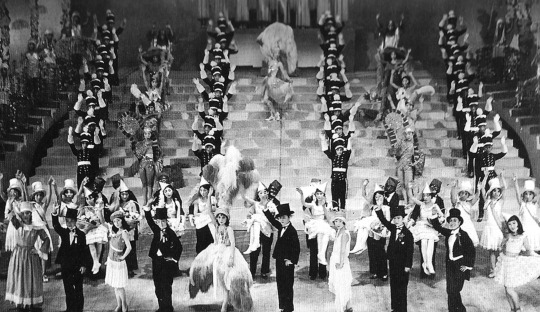
This image is of a showcase from 1930, where you can see the lavish, european revue style inspiration clearly.
In Takarazuka, male roles are called otokoyaku (男役) - which just means 'men's roles' and is the term Jack Jeanne uses for what "Jack" roles are. Female roles are called musumeyaku (娘役) - which translates to 'girl/maiden/daughter roles'. The game actually uses onnayaku (女役) or women's roles when introducing Jeannes.
(Worth noting that the character Kisa plays in the Newcomers' Performance is translated as Maiden but is 娘 (musume) in Japanese which means occasionally when she or other characters are talking about "playing the role of the maiden" they are saying "musumeyaku" which I think is probably an intentional reference.)
Takarazuka puts on Musicals as well as both song and dance revues. It adapts many things, from extant musicals to manga to film, as well as history and classic stories. It has a reputation for being bright, sparkly, and lavish in costuming and set design and dramatic in style.
The voice actor for Tancho, the singing teacher and head of Rhodonite, is a former Takarazuka Otokoyaku. Tancho's outfits and style of speech are directly taken from Takarazuka. The feathers Tancho wears are part of the standard Revue portion of Takarazuka shows.

Right - Tancho's image, from the website, Left - Tancho's voice actor, Nanami Hiroki, from the Asashi article announcing her retirement from Takarazuka, showing her wearing one of the typical feather backed outfits that leads appear in parades after performances.
Otokoyaku are the stars of Takarazuka and tend to draw the biggest crowd and they get top billing, though each troupe tends to have a top Otokoyaku and top Musumeyaku, decided by a complex mix of seniority (especially for otokoyaku) and gradings. I will stop short of saying these are kind of like Jack Ace and Al Jeannes of a class, though. The Musumeyaku is expected to support her Otokoyaku. Using the terms Jack Jeanne uses, for Takarazuka, the Otokoyaku is essentially always the Flower, the Musumeyaku the Vessel, which is more standardized than the point of view of characters at Univeil.
The top Otokoyaku and top Musumeyaku are called the Top Combi (コンビ). Takarazuka and its fandom use that, rather than Partner (パートナー) that Jack Jeanne is fond of, which carries a potentially romantic connotation.
Takarazuka expects its actresses to maintain a more masculine or very feminine (depending on their role) persona on and off stage, and the expectations for behavior and appearance are quite strict even off stage. For example, much like Idols, they are expected to not date, let alone marry and have kids, until they retire.
EDIT: Someone who knows more than me let me know that the rules for dating are slightly more lax now, and relationships are tolerated so long as they are kept strictly out of the public eye - though still no marriage.
Jack Jeanne remains frustratingly vague on the rules for this during school -- No one seems to think dating itself is an issue, but Ao does say that it would 'cause trouble' if people saw them holding hands. So perhaps we're supposed to imagine something similar? But back to the post.
Takarazuka is divided into several different Troupes (組, kumi, read as gumi when used after the name of a troupe). They currently have five.
They break down as follows
Flower Troupe (Hanagumi 花組) - 1921 Moon Troupe (Tsukigumi 月組) - 1921 Snow Troupe (Yukigumi 雪組) - 1924 Star Troupe (Hoshigumi 星組) -1933-1939, reestablished 1948 Cosmos Troupe (Soragumi 宙組) - 1998
Each troupe has a reputation, though they are fairly loosely followed, and many performances get performed by different troupes for different runs. However, I suspect this was a strong influence on the way the classes were divided in Jack Jeanne. For example, Moon Troupe is known for singing. The newest troupe, the Cosmos Troupe is written with a character in Chui's name, and their stereotype is 'experimental and tall'. Snow troupe, interestingly, is known for more traditionally Japanese works (loosely) which is a conspicuous absence from Univeil, especially considering Tamasakaza's style is said to be more traditional than Takarazuka's -- closer to kabuki, even.
In Takarazuka, stars are sorted into these upon graduation. The Music School is probably better as a whole separate post.
The term "Newcomer's Performance" used in the game to refer to the first show of the year is also used in Takarazuka -- shinjin kouen (新人公演), where it has the meaning of a different casting of a play with all newer Takarasiennes (a term used for the actresses of Takarazuka).
The specific announcement that Tsuki makes in the intro is almost exactly, in both wording and tone, the announcement made before each Takarazuka play. His outfit in that scene is a version of a very famous style of Takarazuka Costume, inspired by fancy French dress and specifically the manga Rose of Versaille, whose adaptation is one of Takarazuka's most iconic plays.

I would strongly encourage you to browse their official English Language site (or Japanese one, if you can read it), which can be found here : Takarazuka Revue
While you're there, if you're there for Jack Jeanne reasons, it may be interesting to pay attention to the use of the word "dream" which is one of the theme/motif words of Jack Jeanne, and is use heavily in Takarazuka's official material as well as writings on the subject.
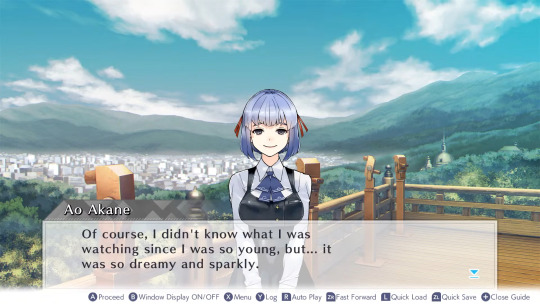
Had to throw this in because these? These are the Takarazuka words right there. Well, their official Motto is "Modesty, Fairness, Grace" or "Be Modest, Be Proper, Be Graceful" (which is a whole lot to unpack elsewhere) but unofficially it could be "So Dreamy and Sparkly."
You'll probably get a more thorough history on the website, too, than I provided.
Rather than make this even longer, I'm going to make a separate post on Takarazuka Music School, the path into Takarazuka, and it's similarities and difference with what we know about Univeil.
I'm by no means an expert of Takarazuka, and I should probably defer to people more involved in the fandom for that, but if anyone has anything to add that I missed in this brief post, please please reblog and add! If you have any questions, I can try to answer, asks should be open!
#explainer#jack jeanne#my posts#this is intended to be a series hence the title#if I've made some zuka fandom faux pas here please let me know!#i do not pretend to know all the rules#takarazuka
43 notes
·
View notes
Note
Doesn’t the Egyptian navy also enforce the blockade?
I thought it was Israel and Egypt both. But I’ve seen no mention of Egypt’s involvement recently.
(I did see that Egyptian authorities have stopped, detained and deported many of the “march to Gaza” activists.)
Explained: Egypt, the Gaza Blockade, and the March for Gaza activists
If you've seen MSM coverage about the Gaza blockade, you may well believe that Israel is the only country enforcing it.
Egypt has also enforced a blockade on Gaza since 2007. This isn't a secret, it's a long-standing policy, but it rarely shows up in activist slogans, protest chants, or international outrage.
That's part of the reason why western March to Gaza activists were so confused by what they encountered in Egypt.
I can't find any clips of these encounters which aren't biased, so this will have to do:
youtube
So let's put this in context.
What Is the Gaza Blockade?
In 2007, after Hamas took control of Gaza from the Palestinian Authority in a violent coup, Israel and Egypt both imposed blockades on the territory.
Israel's blockade focuses on land, airspace, and maritime access (because it shares all of those with Gaza) with the stated purpose of preventing weapons smuggling and rocket attacks. Egypt's blockade is focused mainly on the land border at the Rafah crossing - the only non-Israeli border Gaza has.

Both countries restrict what and who can move in and out. Both justify it on security grounds. Israel cites rocket fire and terror tunnels. Egypt cites Hamas’s ties to the Muslim Brotherhood, a banned and often brutally suppressed group inside Egypt.
What did Egypt do differently at their border with Gaza after Hamas took over?
Tightened Restrictions: Egypt imposed much stricter controls on the movement of people and goods in and out of Gaza.
Rafah Crossing Closure and Intermittent Openings: The Rafah crossing was largely closed by Egypt after the Hamas takeover. It has only been opened intermittently since then, primarily for limited purposes, such as allowing special shipments of medical supplies or facilitating travel for individuals requiring medical treatment.
Participation in the Blockade: Egypt joined with Israel in enforcing a blockade of Gaza, aiming to prevent weapons smuggling and exert economic pressure on Hamas. The blockade has severely restricted the flow of essential goods, contributing to economic hardship and limiting the freedom of movement for Gazans.
Crackdown on Smuggling Tunnels: Egypt launched efforts to destroy the smuggling tunnels that had become a vital lifeline for goods entering Gaza, going so far as to flood the tunnels in 2015.Mediation Efforts: Egypt has engaged in mediation efforts between Fatah and Hamas, the two main Palestinian factions, attempting to broker reconciliation agreements. The Rafah crossing has sometimes been used as a tool in these negotiations.
Focus on Security Cooperation with Israel: Egypt has coordinated closely with Israel on security matters related to the border, which has contributed to the tightening of restrictions on the Rafah crossing.
Egypt's policies regarding the Rafah crossing have not been static. They have varied depending on internal Egyptian politics, regional dynamics, the state of relations between Egypt and Hamas and security concerns.
Here's a snapshot from August 2023 put out by OCHA, using data provided by Hamas (accuracy questionable, but this demonstrates international attention to the matter.)
While participating in the blockade, Egypt has also sought to facilitate the entry of humanitarian aid into Gaza, particularly during times of crisis. For instance, in 2014, Egypt permitted the World Food Programme to bring food through the Rafah crossing.
Does Egypt Enforce a Naval Blockade Too?
Not like Israel does because it doesn't have to. Egypt controls its own coastal waters, but doesn't patrol Gaza's maritime border.
It does tightly restrict access to its land border at Rafah and coordinates with Israel on border and security policies. So while there isn't a direct Egyptian naval blockade, Egypt enforces restrictions on movement and trade just as seriously on land.
Why Don't Activists Talk About Egypt's Role?
Egypt's participation in the blockade is a matter of record. It controls a major border crossing. It restricts people and goods. It's even used violence to destroy smuggling tunnels and detain activists. Yet I've never seen news of protests against Egypt.
Why? Because nuance messes up the narrative and doesn't fit into the oppressor/victim dynamic.
The dominant narrative in much of the West frames the Gaza conflict through the lens of settler colonialism, with Israel as the powerful, evil, European colonizer and Palestinians as the indigenous, helpless, innocent, virtuous colonized. That framing doesn't leave room for Arab states to be seen as complicit or even hostile to Hamas. It flattens the region's politics into a binary that leaves out information which is needed to understand the region.
Put another way, it's easier for some activists to blame Israel alone. Criticizing an Arab country like Egypt (especially one run by an authoritarian government) complicates the story. Also, it doesn't fit on a sign or in a hashtag.
What About the "March to Gaza" Activists?
As noted above, Egyptian authorities detained and deported international activists trying to join a solidarity march to Gaza. These are the same types of activists who accuse Israel of violating human rights for restricting access to Gaza.
So finally, a certain kind of Westerner has noticed that Egypt also has a blockade. Even so, there were no major headlines, no global protests against Egypt, and barely a whisper on social media. Ground News shows the coverage spread is spread pretty evenly.
When Israel stops people at the border, it's called apartheid. When Egypt does it, it's mostly ignored. Why the double standard? (You know why.)
Why Does Egypt Enforce a Blockade at All?
Egypt sees Hamas as a national security threat. Hamas is an offshoot of the Muslim Brotherhood, which Egypt's government sees as a terrorist organization. President Abdel Fattah el-Sisi came to power after removing a Muslim Brotherhood president from office in a military coup. Sisi subsequently was elected as Egyptian president and enjoys substantially more support than his predecessor. He has cracked down hard on violent Jihadist/Islamist movements of all kinds.
In September of 2013, an Egyptian court banned the Brotherhood and ordered the seizure of its assets and associations. In December of 2013, the Sisi government officially declared the Muslim Brotherhood a terrorist organization.
In addition to targeting the Muslim Brotherhood, Sisi's government has waged a continuous and often brutal campaign against various jihadist groups, most notably Wilayat Sinai (formerly Ansar Bayt al-Maqdis), which pledged allegiance to ISIS, in the Sinai Peninsula. This campaign has involved large-scale military operations, curfews, and the displacement of residents.
The Sisi government consistently frames its actions as a necessary "war on terror" to protect Egypt from extremism and instability, and this narrative has resonated with many Egyptians weary of political turmoil.
So Egypt's policy isn't about helping Israel. It's about controlling what happens on its own border and containing a group it sees as dangerous and destabilizing.
Why Does Any of This Matter?
If you want to understand the blockade (and the conflict in general) you need the full picture.
You need to embrace complexity nuance, and shades of grey. You need to let go of the egotistical Western view that the world generally thinks like you do and shares your general values. They don't, it doesn't. The world is too complex to flatten to a binary. Here are some complexities which many Western leftists seem not to grasp:
Arab Regimes are neither Anti-Zionist Saints nor Pro-Hamas Allies.
A common but false assumption among many Western activists is that Egypt and other Arab states are natural allies of Palestinians in their struggle against Israel. Egypt:
Is deeply suspicious of Hamas (an offshoot of the Muslim Brotherhood, which is outlawed in Egypt and viewed as a terrorist threat).
Has its own national security interests that are often at odds with Palestinian groups.
Maintains its own blockade on Gaza, which predates and operates alongside Israel’s.
Western activists who believe that "Free Palestine" is the unifying moral cause of the Arab world often miss that most Arab regimes are more concerned with their own security concerns, domestic stability, counterterrorism, and maintaining authoritarian control than championing Palestinian liberation. It just doesn't matter to them the way it matters to the Western "Pro-Palestinian" activists.
Egypt Co-Enforces the Gaza Blockade
Egypt controls their Rafah border, the only crossing from Gaza not controlled by Israel.
Egypt routinely keeps the Rafah crossing closed, except for specific humanitarian cases or diplomatic arrangements.
Egypt blames Hamas for instability and violence that spills into the Sinai, and it does not want a flood of refugees escaping into the Egyptian Sinai.
Anti-Imperialism Has Become Weirdly Pro-Imperial
One of the bitter ironies of the Western left's approach is that their anti-imperialism tends to romanticize or whitewash non-Western authoritarian states.* In the name of fighting US or Israeli imperialism, they ignore or excuse:
Egypt's military dictatorship and brutal police state.
Assad's war crimes in Syria.
Iran's suppression of women and minorities.
Russia's aggressive expansionism.
China's human rights abuses against many, including the Uyghurs
This highlights broader confusion among Western "Pro-Palestinian" activists
They seem to reduce every situation to "colonizer vs colonized," or "Oppressor vs Victim" and place all Arab actors automatically on the side of victims justly seeking justice...ignoring that states like Egypt, Jordan, Syria, and Saudi Arabia have their own histories of colonialism, suppression, and regional imperialism which are varied, complex, and frequently in competition.
They treat Hamas as if it's just a resistance movement rather than a militant Islamist regime which is:
Hostile to Egyptian authority,
Fundamentally illiberal
Hostile to the rights of women and LGBTQ+ persons
In conflict not just with Israel, but also with Fatah (the Palestinian Authority), Egypt, and much of the Arab world.
Missing out on post-colonial dynamics
Try to watch this with Egyptian eyes:
youtube
The Egyptians in the video don't just despise Hamas. There's more happening here.
Keep in mind that Egypt was ruled (in whole or in part) by the British as a colonial power from 1882 to 1956.
This uninvited guest, this British Welshman who doesn't speak Arabic and knows nothing about Egyptians or Gazans...is condemning and lecturing Egyptians on their moral obligations as Muslims...on their own soil...with patronizing language like "I believe that the people of the Arabic nations have a white heart."
How might you feel if you were an Egyptian cop or soldier who was expected to be calm while being condescended to this way by this man?
Can you see the extraordinary privilege of which this Welshman is totally unaware and how inappropriate his actions are even by the Western left's own domestic standards and social mores?
His condescension to Egyptians is textbook Orientalism. It's cringe on so many levels.
Projection of Western Political Tropes
These activists (instead of learning about peoples who are geographically, ideologically, and politically distant from them and just as complex as people anywhere) project their own local, parochial, left-wing, binary, intersectional frameworks onto a region where those frameworks don’t translate.
In Egypt, you don’t get to chant "Free Palestine" and assume the police will see you as righteous or even harmless. You're more likely to be detained, interrogated, or worse - and not because they oppose dignity, safety, and self-determination for Palestinians, but because they oppose dissent and are sick to death of being condescended to by Westerners who don't know a single thing about them.
Well, Israelis don't know anything about them either!
~20% of Israel's citizens are Arab and speak Arabic. Another 20% of Israelis who are Jews speak fluent Arabic and you can study Arabic as a second language in Jewish public schools in Israel.
About 40% of Israeli citizens speak Arabic.
Most Jewish Arabic-speakers' families came to Israel from Arab lands where they'd lived for centuries as second-class citizens. They know Arab people and Arab culture. They have Arab co-workers, Arab doctors, Arab judges, and Arab members of their parliament. They have no problem seeing Arabs, individually and collectively, as complex, sophisticated people with intelligence and agency.
Israeli journalist Haviv Rettig Gur:
Western activists seeking to enter Gaza via Egypt discovered to their horror this week one of the most obvious and basic facts about the Gaza war: That Egypt's military dictatorship doesn't care one whit how much Palestinians suffer behind the heavily-armed border fence it has installed between Egypt and Gaza. That this came as a shock to Western activists is itself a function of the fact that they know very little about the subjects of their moral emotions, because the basic purpose of Palestinian activism in the West isn't to move the needle for Palestinians - a task that would require knowledge and nuance and a capacity for self-critique - but merely to experience those moral emotions. I know it can be hard to see it, but this is as far from actual focused concern for Palestinians as Iran's, Egypt's and France's diverse hypocrisies. If given the choice between, for example, an Israeli victory that produces a free and prosperous Gaza and an Israeli loss that sends Gaza back into the clutches of Hamas for another generation, most of these activists will enthusiastically endorse the latter. Because feelings.
Yep. Because feelings.
Tacked on at the End: The Open Air Prison Myth
The claim is often made that the blockade by Egypt and Israel made Gaza, until 10/7/23, an open air prison.
I'm not even going to waste words disputing this. Watch these:
youtube
youtube
youtube
youtube
(*Any interest in a future explainer on Tankies?)
Further information:
youtube
#jumblr#march for Gaza#Israel#Gaza#Egypt#Gaza blockade#western hamasniks#illiberal left#“Pro-Palestinian” Activists#Free Gaza From Hamas#explainer#explainers#rafah crossing#hamas#Abdel Fattah el-Sisi
279 notes
·
View notes
Text
What are the Fold & The Un?
Let our magnificent Junior Lore Keeper Jared Deiro de-mystifiy the MIDST Cosmos with his latest deep dive! 🧡
#midst podcast#midst#lark#phineas thatch#moc weepe#audio drama#fiction podcast#explainer#lore#podcast#scifi#fantasy#western#fantasy podcast#audio fiction#soundscapes#midst lore
92 notes
·
View notes
Text
BoA recently hinted at retirement...
[Edited on 240825 for clarity and to include information that was revealed after I initially posted this, which can better contextualize what happened]
I made a thread on Twitter explaining the context behind BoA's recent IG stories, where she hinted at retirement, so I figured that I'd write up a post on it here too.
TL;DR: This announcement was a big shock - BoA has consistently said, up until the week before she posted those IG stories, that she wanted to continue singing and performing. Fans believe that BoA likely hinted at retirement because of the relentless harassment she's faced online.
On April 6th (240406), BoA hinted that she was planning to retire from being a singer entirely. The following day, she stated the exact date her contract was expiring. A few days later, she took down all of her IG posts.
What people seem to miss is that leading up to this, BoA has also been at the receiving end of constant online harassment for months.
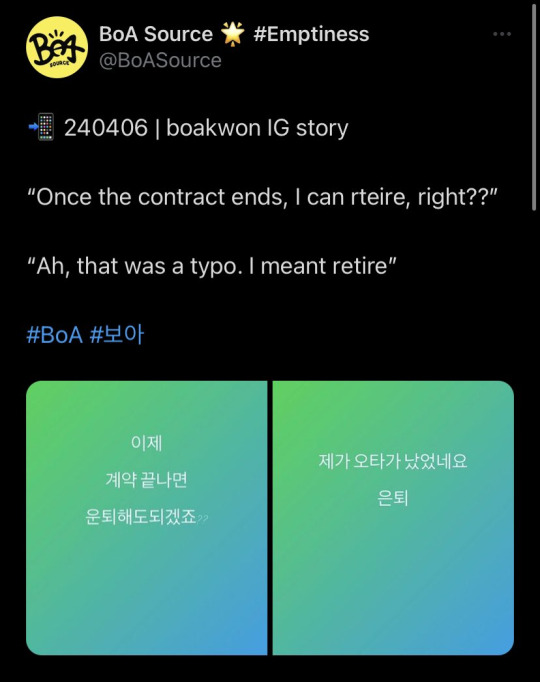
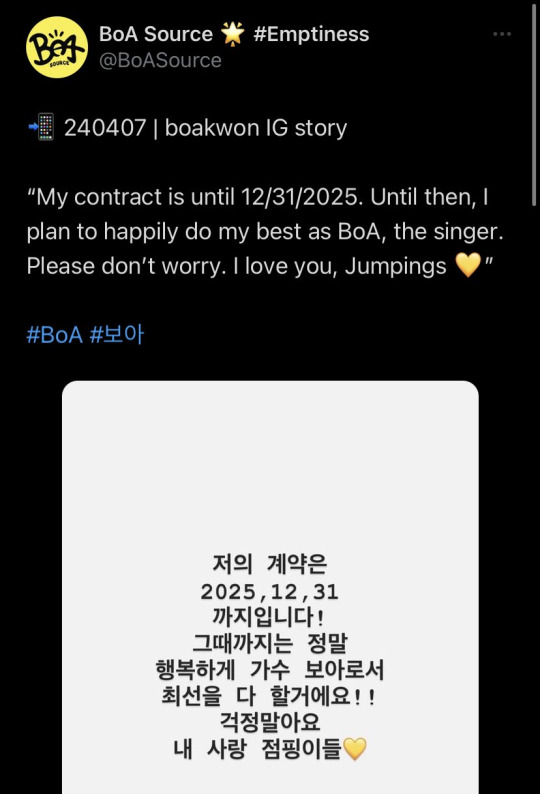

(More under the cut)
BoA has been the subject of huge hate trains, arguably since 2021. This isn't a comprehensive list, but the big ones include:
People disagreeing with her decisions as judge on SWF and SMF, prompting a flood of hate comments on her IG, including accusations that she was 'trying to seduce the male contestants.'
GOT the Beat opened the floodgates for a lot of ageist comments about BoA, who was the group's most senior member. There were also malicious speculations about why she wasn't present in much of the group's behind-the-scenes content; BoA swiftly addressed this via her IG story, explaining that she had to attend a family event. While this wasn't named as the reason, it may be important to note that BoA's brother passed away from cancer on September that same year.
BoA was blamed for 'delaying the solo/group comebacks of her juniors,' in favor of GOT the Beat to 'boost her own career.' Not only has BoA (who is not even the group's leader; she gave the position to Taeyeon) already explained that she did not make the group — she was asked to join it and was, in fact, initially apprehensive — it was also later revealed that comeback delays were due to internal management issues (culminating in the ousting of Lee Sooman and Hybe's acquisition of SM) and because of disagreements about lyrical content. Interestingly, out of all the members of GOT the Beat, BoA ended up being the only member who didn't have a comeback in 2023.
The most recent wave of hate came from her cameo in the drama Marry My Husband, often mocking her appearance.
Since at least February 2024, BoA has been consistently and directly addressing the harassment she's been facing, both in interviews and in her social media. This is something she has rarely done in the 24 years she's been active.
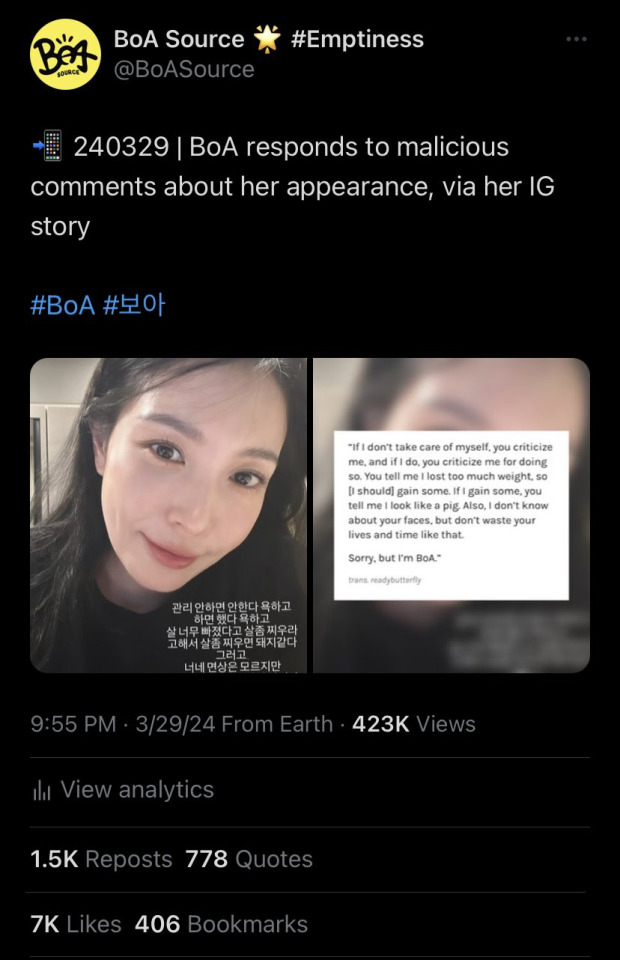

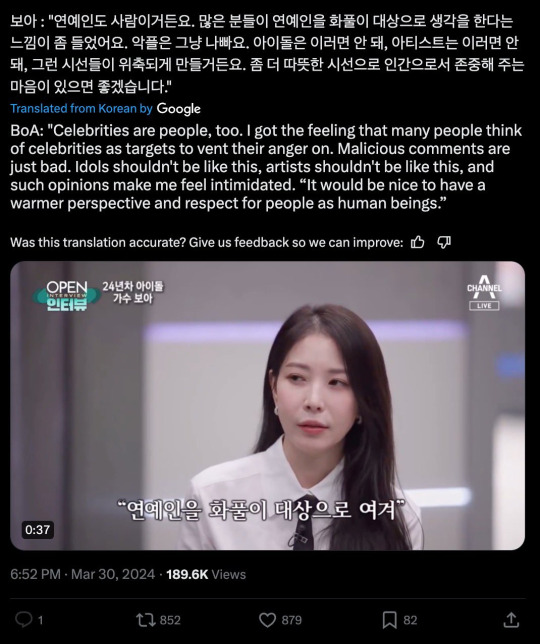
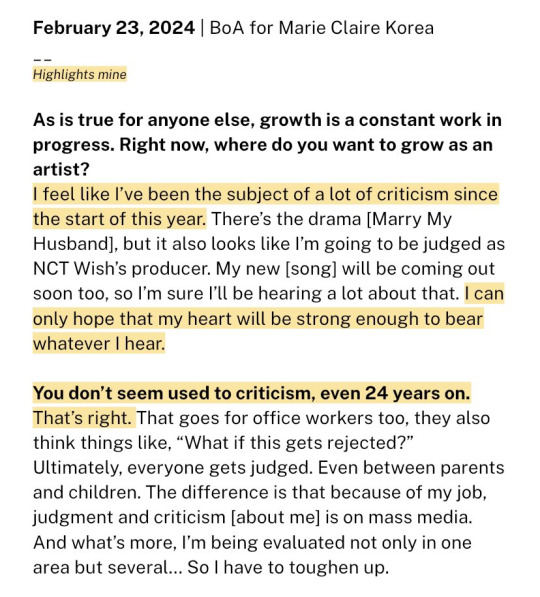
Things came to a head on the evening of March 29th, when BoA posted this on her IG story:

This IG story prompted a huge wave of hate. There were forum posts calling her an attention seeker; notably, there was also a tweet that went viral, of a 'fan' saying that they now planned to unstan BoA because she was now "a completely different person."
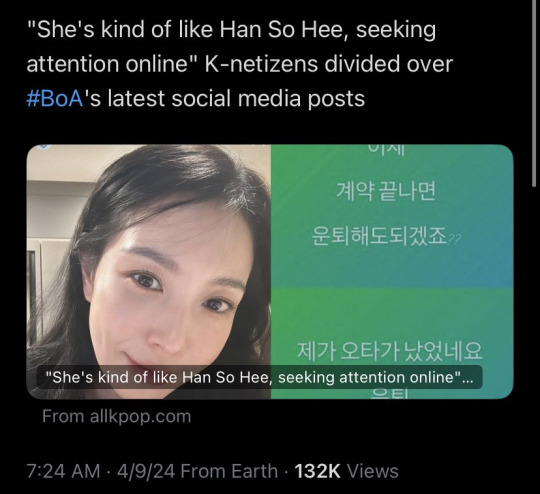

One week later, on April 6th, BoA posted, "It's okay for me to retire right?" with an IG story that clarified that she intended to remain a singer until her active contract expires on December 31, 2025; the implication seems to be that she would no longer be an active singer after 2025.
This came as a huge shock to fans because BoA has consistently said that she wants to keep working as a singer:
August 25, 2020 [her 20th debut anniversary]: "There'll be a 30th anniversary after my 20th. I'll do my best to make good music for a long time, so please always give me your love and support!"
April 23, 2023 [Interview with Uhm Junghwa for W Korea]: "Actually, I'm the type who doesn't look back. After I've accomplished something, I don't have time to think, 'well done' or 'good job' because I'm already thinking of the next step. With that, there's no time for me to rest on my laurels, but this drive allows me to last a long time. It might be the most difficult thing, but my one hope is that I never tire of this job [being a performer], which I love so much."
February 23, 2024 [BoA for Marie Claire Korea]: "Right now, I enjoy my job, and I want to keep doing what I can, given my age."
Most notably, on the afternoon of March 29th — shortly before BoA responded to hate comments about her looks — BoA gave an interview with Esquire Korea, where she basically said that there were still so many things she wanted to accomplish as a singer:
Q: Is there something you still want to achieve? BoA: I want to do a lot of interesting performances. I want to break away from preconceived notions/conventions, sing songs I haven't done before, and create opportunities to communicate more with my audience. Q: What don't you want to change? BoA: My passion for music. Music is where I started. It's my life.
Right after BoA posted her retirement IG stories on April 6th, her fans organized truck protests (something the fandom has never done before), demanding that SM take action to defend BoA from the deluge of online hate.
They were incensed by the fact that in 2022, SM had already promised they would take legal action over malicious comments against her (she even reposted their statement on her personal IG), but nothing happened. In fact, legal action has only been taken in defense of BoA once, in 2020 — 20 years into her career, despite the fact that she's been going through much worse harassment, especially in the early 2000s when she was barely a teenager.

Five days after BoA's retirement announcement IG stories, on April 11th, SM announced that they were going to take legal action. While the statement resembled the one they put out in 2022, they also added that BoA was going through a difficult time, suffering from "great mental pain." A follow-up statement came on April 17th, where SM mentioned specific platforms and forums they were planning to sue. Unfortunately, as of this writing, there have been no further updates.
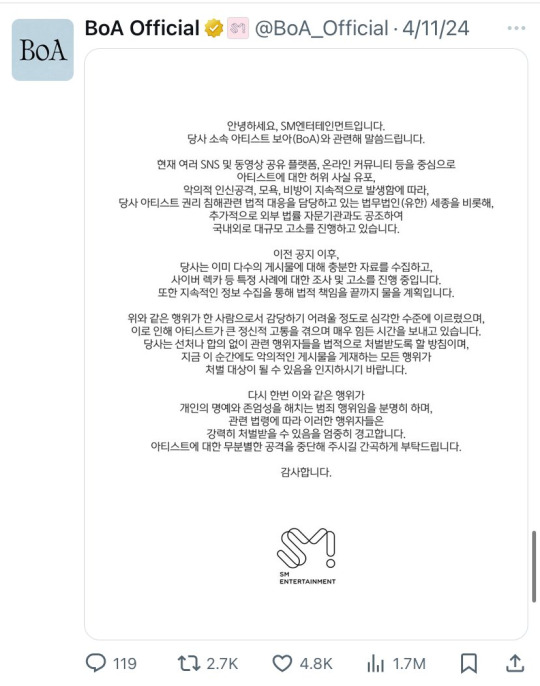

To recap:
On March 29th (afternoon), BoA gave an interview where she said that there was so many things she still wanted to do as a singer.
On March 29th (evening), BoA responded to malicious comments about her appearance on her IG story.
Her IG story quickly went viral in Korea. On March 30th, a post from a fan who claimed to 'unstan' her because of her IG story, garnered millions of views.
On April 6th, BoA hinted at retiring after 2025 on her IG story.
On April 9th, BoA removed all of her IG posts. Fans organized truck protests to call out SM's inaction vis-a-vis the harassment she was facing, in spite of their explicit, repeated promises to act on it.
On April 11th, SM issued a statement that they were going to take legal action against malicious comments about BoA, adding that BoA was suffering "great mental anguish."
As of this writing (August 25, 2024), there has been no formal, official announcement on whether or not BoA is really going to follow through with retiring after her active contract expires. But BoA has remained inactive on social media since April. There were only a handful of times she interacted with fans online: she went on IG live for 4 minutes in May to tell fans that she has plans to hold a concert in October, and she would also sporadically post a sentence-long message on her membership-only Weverse page.
On a more personal note from me: this has just been so disheartening to watch, as someone who's been following her career closely. The idea of BoA retiring was unimaginable to me. She always talked about how she compares her own career to other older artists, how she still feels like a 'baby' with a long way still to go compared to them. Obviously, it is well within BoA's right to change her mind about her own career, and surely, there are things going on behind the scenes that we don't know about. But the news has just been so hard to take because it doesn't feel like she's retiring because she wants to - it feels like she's burnt out.
12 notes
·
View notes